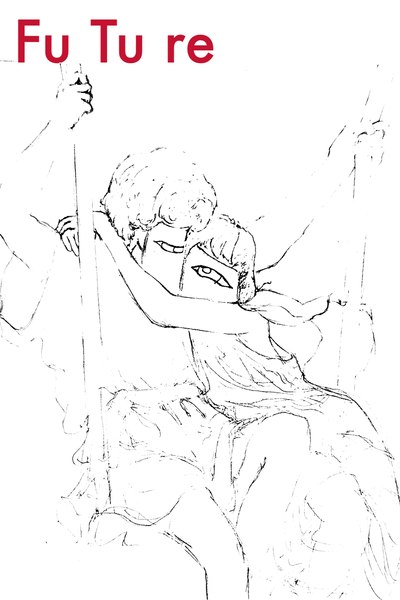Forti fled calmly. As she walked to the single, unguarded door, the bouncer nowhere in sight, she noticed there were many groups of people similar to her age. They hung around like they finished club activities or sports practice. A few were more buzzed, like they came out from a concert. One boy extended his arms, hands wide open, and hung his head. Then he shook his body vigorously as if shot with an electric current and playfully shrieked. His buddies cackled at the crude imitation, slapping their knees, wheezing, folding in on themselves.
Although Forti flung the door open, it closed quietly behind her. She weaved between silhouettes of people through the dark hallway, heading towards the light at the end. Back in the lobby, she jogged out like she had an errand to fulfill. The longer she stayed, the more she felt something inside decaying.
Sitting in a subway train, Forti finally registered the freezing pain nipping at her ears and fingers. A raw, scratchy soreness had settled in her throat, and her eyes stung dry, all because she ran breathlessly through the incoming winter winds, unable to remember much about her run other than the desperate urgency to flee. Although indoors, she sluggishly pulled out her scarf and wrapped it around, comforted by the punctual warmth it emitted. Digging further into her bag, she pulled out her phone. She checked the location tracker app, turning it off, as if her parents would actually put her through a surgery and embed a chip in her. She checked the time. 17:21. She was cutting it close, but she’ll make it. She texted her mom she was coming home.
It was plain city etiquette to not look at anyone in a train.
An unspoken rule.
People kept to themselves, unless with companions, and on this train, everyone was alone. Heads were tucked down, fixed at the floor or at screens. Some had their eyes closed or glazed over. But Forti was too drowsy to heed the social bylaw and grazed her eyes over the passengers.
She was lucid enough to not blatantly stare, but the day had drained her efforts to be subtle. She eyed a man with headphones, bobbing to unknown music and wearing blazing black and red. Across and slightly away from him was another man, older and garbed in an overcoat and trilby hat. There was a woman in a fashionable puffer jacket, standing by a set of doors, looking out the windows and entertained by the stream of art and glowing graffiti on the subway walls. A neutral or maybe another man was napping with crossed arms, their chin resting on their chest. The face of the suearis on the cross flashed across Forti’s mind.
Scrunching her eyes tightly, she tried to erase him, and continued people-watching. A neutral held their phone sideways, and the frantic press of their thumbs implied they were playing a game. They didn’t seem like they were having fun. Nearby was a woman slouched on a bench with legs splayed open, scrolling on her phone, unhindered by her long nails. The man on the cross’s scream echoed in Forti’s skull. She shook her head harshly, as if to throw the clinging memory out of her.
Not a single person, no matter how interesting or outlandish they appeared, could keep her thoughts at bay, could keep the man on the cross away. He was staked in her heart.
It didn’t help that all of the people in the train looked like they could’ve been in that cave, and in a colorful city like Solpolis, it was disconcerting to realize she was in a car with only humans. Forti defeatedly looked down at the floor, seeing her shoes, waiting to succumb to her secret agony.
But the ventilation hummed. The train swayed and purred. The man on the cross didn’t return on his own, so Forti contemplated on her present respite, soothed by the rumbling lullaby of the train car.
Everyone seemed peaceful, within a mortal limbo. They moved without moving and lived as if sleeping. The longer she was in the subway, the farther she was from the chains of the suearis, and she felt her moral responsibility wane.
Out of sight, out of mind, but then it brought back the severed ears to the forefront of her conscience like a dog bringing something it didn’t know it shouldn’t.
In mind, in sight.
When the train arrived at its passengers’ stops, Forti wondered, did a dilemma await all of them too? Did they have to choose between a man’s life and the chance to wake a comatose person? Maybe nothing as specific. For now, they were all someplace where a person could sleep among strangers, and she joined in.
Years of riding the city subway,l trained her subconscious to catch the names of stops, and jolt her awake at the right one. She stepped back onto a fixed platform.
Instead of heading to the stairs to get out of the tunnels, she swerved around pedestrians to an empty area and stayed still. She waited. The subway doors slid shut, the ceiling-high glass doors to enter the train closed, and the train finally zipped with a whir down the maglev track, gone in two blinks. Nothing out of the ordinary. She wasn't expecting much, but she had no desire to face reality yet and gripped onto the lethargic haze from her nap, letting her feet lead the way back home.
On the eighteenth floor of her apartment, she knocked on one of four doors. Her brother opened it and let her in wordlessly.
“Mom, I’m home.” She kicked off her shoes and set them aside in her part of the cubbies.
“Hi Fortien.” Her mother was in the kitchen, preparing dinner. “Did you have fun?”
“Yeah. They talked a lot, though, so I’m a bit tired.”
“Ahsta… Mom knows what you mean,” Forti’s mother said in their native language. “People talk so much. It’s why Mom likes being at home.”
Forti chuckled, or tried to, but it came out as breathy huffs. She could hear the melancholy in her mother’s voice, and retreated to her room after giving her mother a hug from behind. Her brother was already back at his desk, working on homework. Forti collapsed on her chair.
“Where were you?” He asked without looking at her, occupied by his tablet and papers.
“With friends.”
“You don’t have friends.”
“With secondary school friends, they reached out.”
“Is that what you told mom?”
“Get off my back, would you?”
Her brother was quiet, and then mocked Forti’s words in a nasally voice. Forti spun around and pressed her feet at the back of her brother’s seat.
“Hey, get off my back.”
It was Forti’s turn to mock him, and then she began kicking.
Her brother yelled, “Mom! Forti’s bothering me!”
“Mom, Wibby deserves it!”
“Fortien, Wyver, stop bothering each other,” their mother ordered from the kitchen without any severity. Forti gave her brother a final kick with both feet like she was jumping off a launchpad, using the pushback to rotate back towards her desk.
About a little less than an hour later, the siblings heard the front door of their home unlock. Forti had changed into her homewear a while ago, but did nothing else except sit and brood. At some point, Wyver started scrolling on social media as a break. Their father’s voice mingled with their mother’s. He was back home from work. They simultaneously sensed him standing at the doorway to their shared room.
“Hi dad,” they both said.
“Hi Fortien, hi Wyver. Mom finished making dinner,” their father replied.
“Dad,” their mother called out to their father. “What’s this?”
In one of the grocery bags their father brought back was a wine bottle.
“Chercobon sauvignon. They didn’t have your usual so I thought we could try this one. It’s pretty dry, but got lots of good reviews. It’s rated 34.”
Forti didn’t know wine, but Wyver did. Rather than being interested in the alcohol, he was intrigued about the fanaticism for it. That’s how he was with topics—never the subject, always the people that caught his fancy. Although he hasn’t graced a drop to his lips due to his age, he probably knew more about wine than his parents did.
“34 out of 40 in the Raidovin scale is not bad,” he remarked for Forti.
Dinner was quiet, but Forti’s family ate rather than talked. Afterwards, when the dishes and utensils were put in the sink and leftovers were wrapped and stored, the parents prepared to head out.
Forti emerged from the bathroom right when her mother was walking down the short hall to the living room.
“Fortien,” her mother called.
“Yeah?”
“Are you ok? You look sad.”
Forti stilled.
Ever since she exited the subway, her guise had been dropping piece by piece, like a weary warrior shedding plates of armor with each step. When she crossed the threshold to her house, her defenses fell completely, relinquishing sword and shield to be embraced.
Her home was her sanctuary.
She didn’t need to pretend.
She didn’t have to be agile with her words.
Consequently, her mother got concerned by the weary sag of her daughter’s shoulders and the glaze in Forti’s eyes. If Forti was going to lie, she had to do so by telling the truth.
Forti didn’t bother hiding her fatigue, admitting she was too tired. Her friends talked so much. She hadn’t gone outside to hang out in a long time and it sapped all her energy. Over the absurdity of it all, she incredulously smiled. Forti hoped her face revealed nothing more.
Her mother observed Forti very carefully, sensing something off, and then gave her a hug. Forti nearly splintered into pieces.
Her mom said if Forti wanted to talk more, then she wouldn’t leave yet, but Forti reassured she was alright, her arms tightening around her mother’s waist.
Evenings used to be family nights, watching movies or shows and snacking on the couch, which, more often than it should’ve, resulted in second dinners.
The new normal was her parents leaving for the hospital while Forti and Wyver stayed at home. It was a little better than before, in the early days of the coma, when their parents didn’t come home at all sometimes.
“Fortien, Wyver, there’s sliced fruit in the fridge,” their mother said, as she did almost every evening with a different food. “Anything happens, call us. We’ll be back at around three.” Three in the morning.
The siblings occasionally went with them, but only over weekends since they had school. They always went together. It was an agreement neither had to voice. Their father kissed their foreheads and their mother kissed their cheeks, and then the parents left.
Wyver put on headphones and began playing computer games. Forti bugged him to turn on his desk lamp or else his eyes would turn into screens. He said it was fine. She switched the lamp on. He turned it off. They went back and forth.
“You’re going to break my light, ” Wyver grumbled.
They kept at it until Wyver relented after his seventeenth flip. His older sister was the most obstinate person he ever knew, challenging their father for the title.
Forti began her own homework, and after about an hour and twenty minutes, she kicked her brother’s chair again.
“Get me fruit.”
“Wait, let me finish this game first.”
“Get me fruit.”
“Get it yourself.”
“How many minutes?”
“Fifteen.”
“I’m setting the timer.”
Wyver stopped playing when the alert blared. He fled the room before Forti could do anything, nimbly twirling around her, and brought back two bowls of fruit, setting one for each of them. Then he went back to the kitchen to get two glasses of milk.
After another hour, Forti showed him a funny video. He said he saw it already. She scrolled for another.
The normalcy was soothing, like a cooling balm on a burn, and the facade between the pair was natural to perform. Yet, Forti and Wyver knew this play had already fallen apart, merely a distraction they were forced to settle for with the absence of a star actor.
Their room was fashioned like a small dormitory. Forti’s bed was against a wall, and the bunk bed for her younger siblings was on the other side. The bottom bunk had a blanket lopsidedly strewn, an edge almost touching the ground, with a classic video game console and cartridges below the pillow. The top one was clean with untouched sheets, dusted off by their mother every morning. Once, despising its neatness, Forti messed with the duvet to make it look like someone slept there. Her mother panicked upon seeing it, imagining that the ghost or spirit of Forti’s younger sister came home for the last time, and darted to the door, about to rush to the hospital until Forti admitted she rumpled the bed. Her mother still called the hospital to check.
Since then, Forti left it alone.
By midnight, Wyver was reading a fantasy novel and Forti had brushed her teeth. She slipped under her covers and told him to stop after an hour, but they both knew she wouldn’t enforce it. When her head hit the pillow, she braced herself for the oncoming onslaught.
She awoke for a second time into a sleepless nightmare.
Memories were beckoned. They raced towards her like a swarm of biting flies. The day’s events replayed against her will. The stench, the screams, the severed flesh. The thundering in her chest and aching spasms of a strained smile. From the deep depths of her mind, lurking memories of years ago were wrenched out, of embarrassments and faults and youthful ignorance. Then, like an evil torturer, it fetched the memories of her sister.
Her breathing became ragged as tears seeped into her pillow, but she inhaled through her mouth so her brother didn’t have to hear his older sister weep.
He always knew.
She rolled onto her side, towards the wall, and pressed her face into another pillow, pulling the covers over her. She couldn’t run from her own mind, and was forced to relive nine months ago, when her sister was dead.
Second Morning - Nine Months Ago
The moment I close my eyes I’m awake a second time in the day.
It’s another morning but instead of kind sunlight and the mild and sweet drunkenness of a drowse, I’m waking up from a nightmare to another one. The cold mornings where I’m unhappy to get up and wishing to rot in my bed as I lay still, festering and imagining what would happen if I never got up, starving and thirsty but still possessing the stubborn will to stay in bed, and imagine a comforting, happy fantasy to escape reality.
The second morning when I’m unable to fall asleep.
I sit up, the thoughts keep invading
I get up and pace around in the illuminance of the night.
But walking doesn't get rid or keep away or put any distance from my own head.
Stop it, stop thinking, stop asking.
But I feel guilty for trying to stop these thoughts about Vasi.
I want to accept all of them so I don’t run away to keep remembering her and to keep her alive somehow, at least in my mind, yet I want my mind to shut off completely of these things to move on, and I feel terrible.
Maybe with time, thinking won’t hurt anymore.
It won’t be a fresh wound, but an aged scar that pulses from time to time.
Sometimes it’ll be inflamed.
Whenever I look at it, I’ll remember how I got it.
But it’ll never hurt like the day I got it.
I’ll find that when I cry, it won’t take me as long or as hard to stop as I first tried.
I have the strength to move on, and it’s horrible.
Every night Vasi plagues my thoughts.
Is she watching me?
Is she here with me now?
Don’t look at me, if you are, go to our parents, go to Wyver. Not me.











Comments (0)
See all